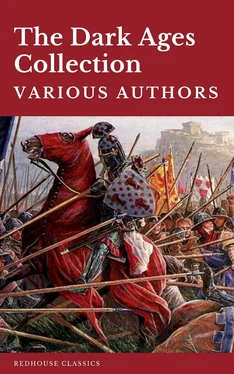§ 3. Theodora
It was probably before he had any prospect of the throne that Justinian formed a violent attachment to a girl of exceptional charms and talents, but of low birth and blemished reputation. Theodora had already borne at least one child to a lover 47when she captured the heart of the future Emperor. According to a tradition — and perhaps she countenanced this story herself, for she could not deny the humility of her birth — she had come from Paphlagonia to the capital, where she was discovered by Justinian, making a scanty living by spinning wool. 48But contemporary rumours which were circulated by her enemies assigned to her a less respectable origin, and told a circumstantial story of a girlhood spent in singular infamy. She was said to be the daughter of Acacius, who was employed by the Green Faction at Constantinople as keeper of the wild beasts, 49which they exhibited at public spectacles. When Acacius died his widow married his successor, but this man was soon deprived of the office in favour of another who paid a bribe to obtain it. 50The woman sent her three little daughters, Comito, 51Theodora, and Anastasia, in the guise of suppliants with fillets on their heads, to beg the Greens assembled in the Hippodrome to reinstate their stepfather who had been so unjustly treated. The Greens obdurately refused; but the Blues had compassion and appointed the man to be their own bear-keeper, as the post happened to be vacant. This incident of her childhood was said to be the explanation of the Empress Theodora’s implacable hostility towards the Greens. The three sisters, when they were older, went on the stage, and in those days an actress was almost synonymous with a prostitute. According to the scandalous gossip, which is recorded with malicious relish in the Secret History of Procopius, Theodora showed exceptional precocity and shamelessness in a career of vice. Her adventures were not confined to Constantinople. She went to the Libyan Pentapolis as the mistress of a new governor, but having quarrelled with him she betook herself to Alexandria, and worked her way back to the capital, where she entrapped Justinian. 52
This chapter of her biography, which reposes solely on the testimony of enemies, has more value as a picture of contemporary manners than as an indictment of the morals of Theodora. It is difficult to believe that if her girlhood had been so steeped in vice and infamy as this scandalous document asserts, she could have so completely changed as to develop into a matron whose conjugal chastity the same enemies could not seriously impugn, although they were ready to insinuate suspicions. 53But it would be foolish to argue that the framework of the story is entirely fictitious. Theodora may have been the daughter of a bear-keeper, and she may have appeared on the stage. And her youth may have been stormy; we know that she was the mother of an illegitimate child.
After the rise in his fortunes through the accession of his uncle, Justinian seems to have secured for his mistress the rank of a patrician. 54He wished to marry her, but the Empress Euphemia resolutely opposed this step, and it was not till after her death 55that Theodora became the wife of Justinian. When he was raised to the throne, she was, as a matter of course, crowned Augusta.
Her beauty and charm were generally acknowledged. We may imagine her as a small pale brunette, with a delicate oval face and a solemn intense expression in her large black eyes. 56Portraits of her are preserved in marble, in mosaics, and on ivory. There is a life-size bust of her at Milan, which was originally coloured; the tip of the nose is broken off, but the rest is well preserved, and we can see the attractiveness of her face. 57Then we have two ivory tablets representing her in imperial robes. 58These three portraits show her probably as she was from the age of thirty to thirty-five. She is visibly an older woman in the mosaic picture in the church of S. Vitale at Ravenna ( c. A.D. 547), but the resemblance to the bust can be discerned in the shape of the face, in the mouth, and in the eyes. But the dominion which she exercised over Justinian was due more to her mental qualities than to her physical charms. A contemporary writer praises her as “superior in intelligence to all the world,” 59and all that we know of her conduct as Empress shows that she was a woman of exceptional brain and courage. Her influence in the Emperor’s counsels was publicly acknowledged in a way which had no precedent in the past. In a law which aimed at suppressing corruption in the appointment of provincial governors, the Emperor declared that in framing it “we have taken as partner in our counsels our most pious consort given to us by God.” 60At the end of the law an oath of allegiance is prescribed. The official is to swear loyalty to “our divine and pious despots, Justinian, and Theodora, the consort of his throne.” But although Justinian’s devotion to his wife prompted him to increase her dignity and authority in the eyes of the Empire in unusual ways, it would be a mistake to suppose that legally she possessed powers which former Empresses had not enjoyed or that she was co-regent in the constitutional sense. 61Custom was strained to permit her unusual privileges. For instance, she is said to have received foreign envoys and presented them with gifts “as if the Roman Empire were under her rule.” 62Chosroes was amazed when his minister Zabergan showed him a letter which he had received from Theodora urging him to press his master to make peace. 63Such incidents might well give the impression that the Empire was ruled by two co-equal sovrans, and some thought that Theodora had greater power than Justinian himself. 64Such power as she possessed she owed to her personal influence over her husband and to his toleration of her intervention in public affairs.
She was not indeed content to pursue her aims merely by the legitimate means of persuading the monarch. When she knew that he had resolutely determined on a line of policy which was not in accordance with her own wishes, she did not scruple to act independently. The most important matter in which their views diverged was ecclesiastical policy. Theodora was a devoted Monophysite, and one of her constant preoccupations was to promote the Monophysitic doctrine and to protect its adherents from the penal consequences which they incurred under Justinian’s laws. Her husband must have been well aware that she had an intelligence department of her own and that secret intrigues were carried on of which he would not have approved. But she was clever enough to calculate just how far she could go.
Her power of engaging in independent political action was due to her economic independence. She had large financial resources at her disposal, for which apparently she had to render no account. The personal expenses of an Emperor’s consort and the maintenance of her household were provided by estates in Asia Minor which were managed by a high steward known as the Curator of the House of Augusta, 65who was responsible to her. Justinian appears to have increased these estates considerably for the benefit of Theodora. 66He gave her large donations on the occasion of her marriage. 67The house known as the palace of Hormisdas, in which Justinian had resided before his elevation to the throne, was enlarged and enclosed within the precincts of the Great Palace, and placed at the disposal of the Empress. 68
Theodora did much to deserve the reputation of a beneficent queen, always ready to use her influence for redressing wrongs, 69and particularly solicitous to assist the unhappy of her own sex. 70To her initiative are ascribed the stringent laws which were passed to suppress the traffic in young girls, which flourished as actively then as in modern Europe, and was conducted by similar methods, which the legislator graphically describes. Agents used to travel through the provinces to entice to the capital poor girls, sometimes under ten years of age, by the bait of fine clothes and an easy life. Indigent parents were easily persuaded by a few gold coins to consent to the ruin of their daughters. The victims, when they came to the city, were fed and clothed miserably, and kept shut up in the houses of ill-fame, and they were forced to sign written contracts with their infamous masters. Sometimes compassionate patrons of these establishments offered to deliver one of these slaves from her misery by marrying her, but the procurers generally refused to consent. The new edict forbade the trade and ordered that all procurers should be banished from Constantinople. 71The principle of compensation, however, seems to have been applied. The patrons were allowed to state on oath how much money they had given to the parents of each girl; the average price was five nomismata, and Theodora paid the total out of her private purse. 72To receive unfortunate women who abandoned a life of shame, a palace on the Asiatic shore of the Bosphorus, not far from the Black Sea, was converted into a convent which was known as Metanoia or Repentance. 73
Читать дальше












